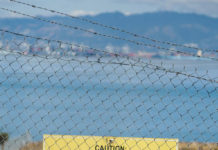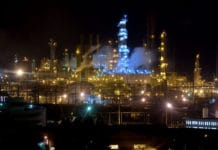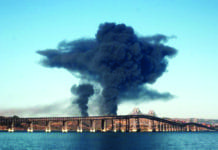Richmond, Calif. – Communities across the region’s oil belt stood up to industry pressure to demand that air officials clean up refinery pollution instead of letting it worsen at a news event and air policy workshop today.

“Communities and workers are fighting to protect our health, safety and climate from dirtier oil projects that our Air District should be stopping instead of proposing to allow,” said Andrés Soto, Communities for a Better Environment (CBE).
At issue are new regional rules on refinery emissions monitoring and control that are being developed by the Bay Area Air Quality Management District. Despite an Oct. 15, 2014, vote by the District’s board to develop rules that would reduce refinery emissions of toxic, smog-forming and climate-disrupting air pollution, the rules it proposes now include loopholes that allow increased emissions from new oil projects.
“I am outraged that those in charge of ensuring clean air and public safety continue to allow the fossil fuel and railway corporations to devastate the health and lives of not only people who live near refineries and tracks but the entire Bay Area. Why do they continue to allow emissions that contribute to climate chaos in spite of what they know? California is supposed to be a leader,” said Penny Opal Plant, Idle No More SFBay.
Previous Air District reports estimated that air pollution contributes to thousands of premature deaths in the Bay Area each year and that oil refining is the region’s biggest industrial emitter.
“The 22 elected officials on the District’s board voted unanimously when they directed their staff to draw up requirements to reduce refiners’ health-threatening and climate wrecking emissions. But their staff’s proposed rule ignores that directive.
“Bay Area residents should be outraged by this betrayal of public trust. The board must direct its staff to rescind its weak proposals, enact a moratorium on permitting emissions from all pending oil projects and keep its promise for protective rules with real teeth,” said Shoshana Wechsler, Sunflower Alliance.
Previous Air District reports estimated that air pollution contributes to thousands of premature deaths in the Bay Area each year and that oil refining is the region’s biggest industrial emitter.
New oil projects that threaten to increase routine and catastrophic emission incidents by enabling the delivery and refining of cheaper, lower-grade oils are now planned or being implemented in Richmond, Rodeo, Martinez, Benicia and Pittsburg. Meanwhile, the industry’s own reports identify specific feasible measures that could reduce refinery emissions.
Community and worker groups had joined to develop new rules to cap and then reduce refinery emissions with the Air District since 2012. On Feb. 27, 2015, 25 of these organizations demanded that it:
- Rescind proposed exemptions that would allow increasing refinery emissions of greenhouse gasses and increasing refinery emissions of toxic and smog-forming pollutants from “dirtier” oil projects that boost refinery crude throughput; and
- Enact a “moratorium” that puts a hold on new air permits for new oil projects until the agency’s proposed rules are properly revised, adopted and effective.
Today’s action follows a community uprising during the Air District’s first community workshop on its proposal that was held in Benicia the evening of Monday, March 16, 2015, and the filing earlier this month of lawsuits challenging a Phillips 66 project at its refinery in Rodeo by community and worker groups.
“People who live or work in and near refineries and crude-by-rail corridors know that the dirtier crude increases the risk of refinery and train car explosions. But for Big Oil, the loss of lives and the exploding rail cars dumping crude into our water systems is just the price of doing business,” said Nancy Reiser, Crockett-Rodeo to Defend the Environment.
For Big Oil, the loss of lives and the exploding rail cars dumping crude into our water systems is just the price of doing business.
“The Sierra Club stands with frontline communities in calling for strong regulations that reduce toxic refinery pollution and lower greenhouse gas emissions,” said Sierra Club San Francisco Bay Chapter conservation organizer Ratha Lai. “Unchecked and unmitigated refinery pollution is an environmental injustice and a public-health nightmare.
“If we allow Bay Area refineries to maximize their profit margins by bringing in dirtier and more volatile crude oils such as Canadian tar sands and fracked Bakken shale, we will pay the price with our health and our climate stability,” he said.
The Air District plans a third community workshop at 5:30 p.m. on Wednesday, March 18, 2015, in Martinez. Just before that workshop, at 4 p.m. on Wednesday, March 18, at the South Gate of the Tesoro Martinez refinery, the refinery workers union United Steelworkers has called a protest action over the alleged firing of workers on strike over refinery safety concerns.
For more information, contact Andrés Soto, Communities for a Better Environment, at andres@cbecal.org.

 Store
Store











